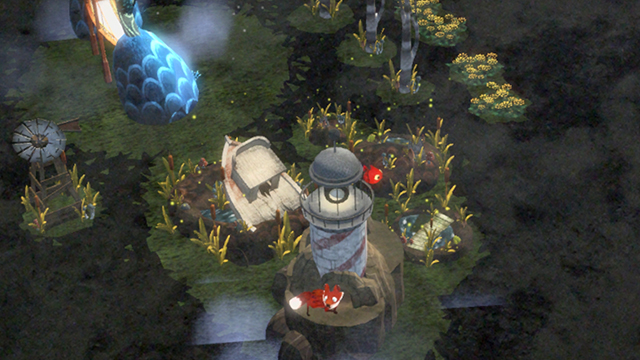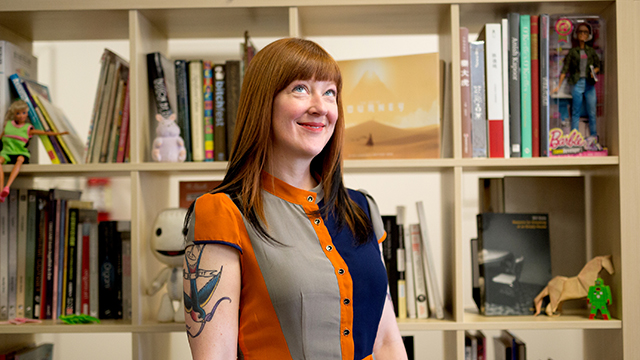GR: How do you look at the AR in general?
RH: If you think about it now, you come here and put the headset on and use it and it’s cool. But maybe 10 years from now, that’s just how it is. When you wake up in the morning, you have a virtual alarm clock over your head and it’s a little cuckoo clock and when you look up, it comes down and it wakes you up. Maybe you have a little fish bowl that’s resting here that has seahorses and jellyfish and a tiny shark swimming around inside of it. And you sprinkle some virtual food inside on it and it does some fun stuff and maybe you get a few new seeds to plant. And then you walk to your kitchen and there is a clock on the wall that are reminders of stuff you need to do today or three or four different outfits that you can wear because it’s raining. That would be really nice.
I don’t think it’s that hard to imagine what that would feel like but for most people, that’s not how they see the world right now. The idea of even just having empty spaces but that through a glasses or contact lenses, there is something there. That is really science fiction right now but it’s not that far away. Getting to this place of imagining these spaces is what Funomena is supposed to do as a company and it’s what I try to do as a designer.
If we’re not careful, you might wake up and look up and there be an ad on the ceiling that someone is paying you to look at for 10 minutes before you get out of bed.
GR: Well, if I could look at a Colgate ad and get $20…
RH: When when you think about it, you do look at a Colgate ad every morning for $20 and you pay for that ad to be in your house. What is the barrier there? What are the ethics there? What is the reason that that thing exists? And so that’s a question: can we come up with a future that gives everybody the amount of freedom to have as many beautiful and creative things in their lives as possible? And to be peaceful, connected, and friendly. That would be really nice.
So that’s why I do it and why we’re so happy with the partnership with Magic Leap. I feel that Rony [Abovitz] really believes that this is part of our duty as designers to think through these things before it’s too late.

GR: So what are the ethics of AR?
HR: We need to be building creative, expressive, beautiful experiences that connect people and build a layer over our reality that helps us coordinate our actions and helps us with an emergency or when we want to catch the bus. At LeapCon, Rony gave some compelling examples that this kind of spatialized computing platform could truly change the way that we see.
One of the core questions is if the customers have their data. When you move around in the virtual space, who knows where you are going? And who do you let know? Right now you have a phone in your pocket and you are letting a lot people know where you’re going and what you’re doing. It knows a lot about you. It often knows where you’ve been eating and how often you’re taking a Lyft. It’s a lot of data and who owns it? It’s a interesting question.
The ethics are quite broad reaching and important to think of ahead of time. A lot of technology that has been developed so far, they didn’t really think it through ahead of time. They just made phones, computers, and game consoles and thought that it seemed good. And then later, it was like oh… [sigh]
GR: And then we’re gonna find out that in the 2032 election that we got hacked through our eyes or something.
RH: Exactly! [laughs] There are a lot of things that we invented that have unconscious bias locked in. One of my favorite examples is film. When we first developer the first concept of films, film didn’t represent all skin tones accurately because the people that made it didn’t think it was important. It didn’t cross their mind. We have an opportunity with AR now is to have those kinds of things cross our mind to be much more conscientious of inclusion, diversity, equality, and fairness.
GR: It sounds like you’re optimistic and skeptical about the future.
RH: Well, I am a roboticist and AI programmer by background so I expect things to take longer than people initially planned because that is the way it is. “Man plans, God laughs” is what you say when you’re making a game. [laughs] It takes twice as long to do anything as you ever planned which is how life is. I also think that it’s inevitable that if we can reduce the amount of hardware to see a picture, [that would be great].
Like that TV. I bought it in 2005. It was state of the art. Now it’s clunky and we just use it for old game consoles. The Magic Leap just replaces this completely with a tiny bit of computing. You could just watch TV on the wall. It saves electricity, mercury, and plastic. There’s a lot of stuff in landfills of building CRT televisions. We would get rid of a lot of that stuff if we moved away from this sort of display technologies.
For me, the exciting this is expanding our ability to see things in a variety of contexts and at the same, reducing the amount of waste that we create. That is one of the most exciting thing about this tech that very few people think to talk about. We’ll have the ability to share data and see things happening without having this stuff around. Like think about how this office would look if it didn’t have any monitors? [laughs]
GR: It would be a lot of people staring into nothing. [laughs]
RH: That’s the thing! It seems weird to you now but they’re just staring at these big squares of plastic. What on earth makes that a good thing? In fact, it’s actually bad for your eyes. So when you hear that people would be staring into space, it’s like when you see people walking down the street talking to no one and now you go, “They’re probably wearing earbuds.” When I was your age, if I saw someone walking down the street talking to themselves, I would definitely make a hard left. [laughs]

GR: This is a lot of big picture stuff. So what do you think of games in this space?
RH: It’s still super expansive. Games in AR are effectively putting yourself in an MMO. You are now living in an MMO doing your thing. You’re in the virtual world that someone else has made, you’re in their ruleset, and you’re the avatar now. That’s it! It’s exciting but kind of the same thing that we’ve always had. It’s not new.
It’s a good opportunity to learn from people that made Everquest, World of Warcraft, Ultima Online, and the very first text-based MUDs. When you think of that technology moving forward, you look back at those designs and understand them from the perspective of game design. I’m excited because it means I get crib all my best designer friends. [laughs] And there are a lot of amazing people that are making MMOs now in the context of this new technology and I think you’ll see a lot of cool stuff in the future.
GR: So Luna: Moondust Garden is a first step?
RH: Definitely. But also an important first step. It’s really, really critical to get very familiar with the core new player experience and the onboarding and for us to understand how people experience this technology from the moment of being very fresh. It’s been critical to do that. We’ve been able to deal with the fidelity and the placement stuff. And so the next thing will be probably other people and a lot more motion, characters, and people being much more autonomous.







